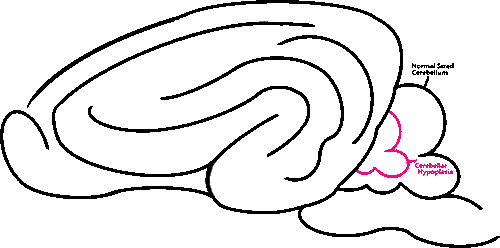About Cerebellar Hypoplasia
IMPORTANT INFORMATION
Please always get veterinary advice - there are many different neurological conditions that can affect puppies and dogs.
If a puppy or dog is showing symptoms listed, please contact your vet as soon as possible.
Disclaimer: We are not veterinary professionals - the information provided has been gathered through our own reading as we look to support Holly.
What does Cerebellar Hypoplasia Mean?
Cerebellar
-
Refers to the complex part of the brain that controls the range, rate and force of movements [1].
-
The Cerebellar detects subtle shifts in balance and sends messages to other parts of the dogs body, so to maintain balance and keep upright.
-
Co-ordinates muscles to work together so that the body moves intentionally and smoothly.
-
The Cerebellar co-ordinates eye movement.
-
Helps the body learn fine and gross motor skills [2]
Hypoplasia
-
refers to the under-development of an organ or tissue.
Cerebellar Hypoplasia is a rare neurological condition that affects the development of the Cerebellum whilst a puppy is in the uterus. The Cerebellum is situated at the back of the brain and is responsible for sending fine-tuned motor signals from the brain to the muscles, allowing for balance and coordination [3]. For puppies with CH, like Holly the Labrador, this means that a physical part of the brain is underdeveloped and therefore certain symptoms will be observed early in the puppies life.
Holly the Labrador was diagnosed with CH when she was eight weeks old after a full examination by a vet. An MRI can be performed to confirm a case of Cerebellar Hypoplasia, however, in Holly's situation this was not deemed necessary. Although, we can't be certain to the reasons why Holly is affected by CH it is likely to be a genetic issue. Other causes of CH can be a blood clot or an infection whilst in the uterus (the latter is mainly found in cats and extremely rarely in dogs).
The Cerebellum

Facts about CH
-
CH doesn't cause pain.
-
CH symptoms do not get worse over time, they stay the same.
-
Some puppies get better as they adjust to their cerebellar challenges.[4]
-
CH affects walking, co-ordination and balance.
-
CH dogs can live a happy contented life with the right support.
-
Cerebellar Hypoplasia doesn't impact on a pet's lifespan.
-
Cerebellar Hypoplasia is a rare disease in dogs.
-
CH Dogs are more at risks of falls and injuries.
Causes of Cerebellar Hypoplasia

-
Viral or Bacterial Infection in utero. Parovirus in seen widely in cats but less likely to be the cause in dogs.
-
Poisoning
-
Malnutrition
-
Damage or trauma whilst the fetus is developing
-
Inherited
-
Unknown Causes [5].
Find Out More Here
References: [3] Canine Hereditary Ataxia--The Hunt for the Genes [1} [2] & [4] greatpetcare.com [5] VetBio





